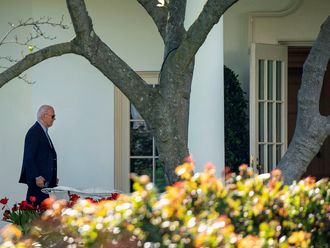Washington: Nearly a year after about 200 people were charged with rioting during President Donald Trump’s inauguration, federal prosecutors announced they would drop a majority of the cases because they could not prove the defendants planned or participated in protests with the aim of smashing storefronts, setting fires and causing other property damage.
The US attorney’s office in the District of Columbia said it was dismissing charges against 129 people awaiting trial. Prosecutors said they would move ahead with cases against the 59 who they say were directly involved in the riots.
In a court filing, prosecutors said they plan to focus on “the core group that we believe is most responsible for the destruction and violence that took place on Inauguration Day”.
The decision comes about a month after a District jury acquitted the first six people to go to trial on rioting charges stemming from the January 20, 2017, celebration. Lawyers for those defendants argued they were lawfully protesting while others in the group peeled off to vandalise businesses and vehicles.
The prosecutors’ decision, announced late on Thursday, was applauded by supporters of the protesters who have argued the government overreached in its response.
Oliver Harris, 28, of Philadelphia, who was one of the six protesters acquitted last month, said the dismissal is “a victory for those whose charges were dropped, but we now also have to redirect our support for those 59 persons whose charges are remaining.”
In all, 234 people were charged in connection with the riots. Twenty of them have pleaded guilty, and prosecutors previously dropped cases against another 20.
Trials for the remaining defendants were set to proceed through the year, with the next set for March.
The prosecutors dismissed the charges without prejudice, which means charges could be brought at a later time. But new charges usually are brought in more serious cases, such as those involving violent crimes.
During the first trial last month, prosecutors said the six defendants were among a group that cut a violent swath through 16 blocks of the city, smashing businesses’ windows, tossing newspaper boxes into the street and damaging a limousine. Authorities tallied the damage at more than $100,000 (Dh367,315).
The group used “black-bloc” tactics, prosecutors said, wearing dark clothes and hiding their faces with masks and goggles so it would be harder for authorities to identify them while they participated in violence.
While the prosecutors had no evidence showing the six defendants at last month’s trial directly caused damage, they argued the whole group essentially provided cover to the vandals.
Judge Lynn Leibovitz dismissed the most serious charge against the six, finding there was no evidence they urged others to riot. Jurors later acquitted the defendants on the remaining charges, saying after trial that prosecutors failed to prove that the six actually participated in the riots, as opposed to being part of the group who were peacefully demonstrating.
But jurors said after trial that prosecutors failed to prove that the six defendants actually participated in the riots, as opposed to being part of the group who were peacefully demonstrating.
The acquittals left legal observers and defence attorneys wondering whether prosecutors would pursue the remaining cases. At the time, the US attorney’s office promised to press on.
“In light of the legal rulings by the court and the jury’s verdicts in the first trial of these cases, the government has decided to proceed with all of the pending charges set forth in the superseding indictment,” Assistant US Attorney Jennifer Kerkhoff, the lead prosecutor on the case, wrote after that verdict.
But on Thursday, prosecutors said they would focus on defendants who they believe planned or caused damage — or those evidence shows conspired to use black-bloc tactics.
The case follows one of the largest mass arrests for vandalism in the city, and authorities spent months mining for evidence. Authorities confiscated the cell phones of the defendants to examine text messages and videos. And prosecutors sought court orders for internet records, including website visits and Facebook accounts, in hopes of securing evidence to support their contention protesters planned to participate in a violent demonstration. The searches were challenged by attorneys and civil liberties groups.
Defence attorney Betty Ballester said she is looking forward to telling her client, Kenneth Delacruz, 22, of New York, that his case has been dropped.
“This is such good news. I haven’t stopped dancing,” she said. “The prosecution had to rethink things after that first trial.”











